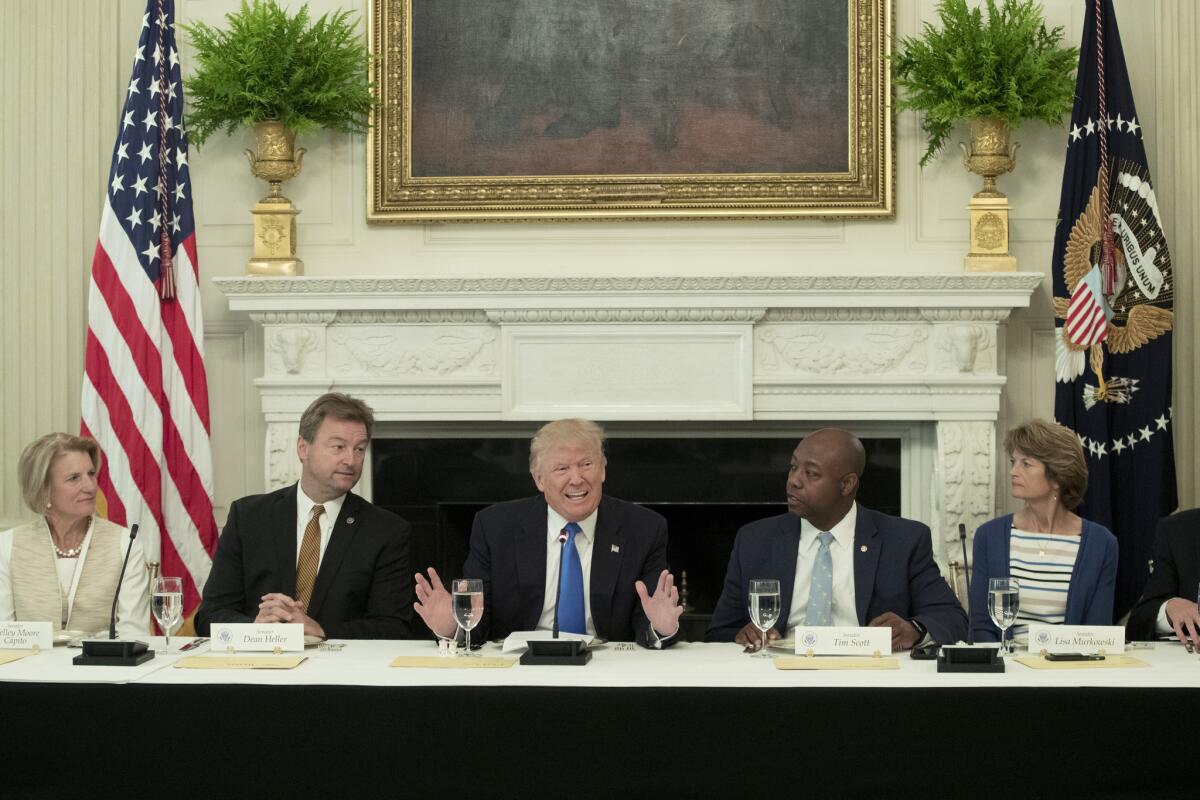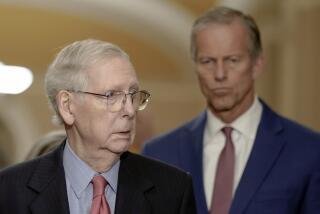Trump, reversing course, wants Senate Republicans to finish Obamacare replacement, but chances remain dim

President Trump resurrected his party’s effort to replace the Affordable Care Act on Wednesday, a day after the Senate legislation collapsed, by abruptly reversing course to push Republican senators to work through their August recess until they pass something.
Trump’s attempt to inject fresh momentum into an effort that has split his party came as a surprise at a White House lunch for the senators, given his defiant statements on Tuesday that he would simply “let Obamacare fail” — a stance that seemed to end the long-running GOP bid to undo his predecessor’s healthcare legacy.
The president’s shift seemed a tacit acknowledgment of the political danger of walking away from a campaign promise he’d made to repeal the law, just as Republicans had vowed for years before him. Yet he also seemed to grasp that simply letting the health insurance program unravel without a replacement was not politically sustainable, now that 20 million Americans depend on it for healthcare coverage.
“For seven years you promised that you would repeal Obamacare,” Trump chided senators as they sat down for lunch.
“Inaction is not an option. And frankly, I don’t think we should leave town unless we have a health insurance plan, unless we can give our people great healthcare.”
Despite new interest from the president, who for months has done little to sell the legislation to members of Congress or the public generally, the chances of success remain dim.
Although Trump repeatedly portrayed the Senate as “close” to reaching agreement, the 52 Republicans remain deeply divided over healthcare policy and can afford to lose just two votes given the united opposition of Senate Democrats. Top administration officials planned to meet with holdout senators late Wednesday to kick-start negotiations.
Senate Majority Leader Mitch McConnell (R-Ky.) insisted he would push forward with a vote next week to start the legislative debate, but it is not clear he will have the 50 votes needed to proceed.
The inability to clear that hurdle stopped the bill this week. Several Republican senators had said they would vote against even proceeding to debate because they so objected to the legislation that McConnell had brokered behind closed doors. Most were unwilling to simply repeal Obamacare but could not agree with colleagues on alternatives for replacing it.
McConnell, backed by the White House, argued that Republicans had no chance to keep their campaign promise if they didn’t at least start the debate process. He promised that senators would have ample opportunity to offer amendments and shape the final product.
“It’s pretty obvious that we’ve had difficulty getting 50 votes to proceed,” McConnell said after the lunch meeting. “But we cannot have a debate until we get on the bill.”
Or as White House legislative director Marc Short put it: “It’s a little bit like Leslie Nielsen in ‘Naked Gun,’ with an explosion behind you, saying, ‘There’s nothing to see here.’”
“If you’re not willing to move to proceed,” Short added, “you’re basically acknowledging there’s nothing wrong, that Obamacare is fine.”
Senators emerged from the White House luncheon seemingly upbeat, but also skeptical that their differences could be resolved in the days ahead.
Conservatives want to fully end the Affordable Care Act, while more centrist senators want to preserve aspects of the law, including its Medicaid expansion in their states.
Republican governors are among the most powerful critics of the overhaul effort in Congress, and key senators, including Dean Heller of Nevada and Rob Portman of Ohio, are not likely to part ways with governors from their own party who have been among the most vocal.
“We’re just going to continue discussions,” Heller told reporters at the Capitol.
Trump used a familiar approach with senators — mixing friendly banter with pointed jibes. At one point, Trump singled out Heller, who was seated to his immediate right at the table and is considered the most endangered Republican senator facing reelection in 2018. The president awkwardly implied Heller could lose his job unless he backed the Obamacare repeal.
“He wants to remain a senator doesn’t he?” Trump said, prompting a game smile from Heller.
But for Heller, and others, keeping aspects of the Affordable Care Act in place may be the more politically viable route to reelection in states like his with many beneficiaries.
The Republican legislation would cause a projected 22 million Americans to lose insurance coverage. Simply repealing Obamacare without a replacement would leave 32 million Americans without insurance and also cause premiums to double by 2026, the nonpartisan Congressional Budget Office said in an updated reported on Wednesday.
The White House encouraged senators to let the administration know what changes would be needed to win their support. By retaining some of the Obamacare taxes on high-income earners, the Republican bill would preserve revenue that could be used to shore up coverage.
“We’re going to spend some more money to make sure everybody is protected,” Trump said.
Sen. Ted Cruz (R-Texas) has emerged as a key architect of the replacement plan with a provision that would allow insurers to offer cheaper, skimpier policies. That won over some Republicans who believe it would lower premium costs for consumers. But others doubt the bare-bones policies would offer adequate coverage, and the insurance industry has pronounced the idea unworkable.
Some Republicans touted a new administration report purporting to show that health insurance premiums would go down, and insurance coverage up, under the Senate GOP approach — contrary to the Congressional Budget Office’s findings. But the report was widely criticized by independent experts who pointed out numerous flaws in its methodology.
“We came from that meeting with a renewed commitment to keep working, keep negotiating, to get to yes,” Cruz said afterward. “In my view, failure is not an option.”
Whether Trump’s revived interest in healthcare will provide the push needed to reach consensus remains uncertain, in part because of the president’s own widely shifting views.
“I don’t know that lunch with 50 or 60 elected officials gets you very far,” said former House Speaker Newt Gingrich, a Trump ally.
McConnell had already announced that senators had to forfeit the first two weeks of what was to have been the traditional August recess.
Most Americans say they want Republicans and Democrats to work together to fix Obamacare, rather than repeal it. But that bipartisan approach did not appear to be on the lunch menu at the White House.
With reporters and cameras briefly in the State Dining Room, Trump repeatedly said that President Obama had lied about his signature domestic initiative as Obama worked in 2010 for its passage. Trump also dismissed congressional Democrats as disinterested in working on solutions, though Democratic leaders have repeatedly called on Republicans to work with them to improve the ACA, not repeal it.
Republican senators seemed relieved that Trump had backed off, for now, on his intent to simply “let Obamacare fail.”
“It’s not the responsible thing to do,” said Sen. Ron Johnson (R-Wis.), who is among the conservatives who have objected to the initial Senate bill. “I think people realize we have to get to a result, because this is what we promised.”
Times staff writer Noam N. Levey in Washington contributed to this report.
Noah.Bierman@latimes.com
ALSO
Two more Republican senators announce opposition to healthcare bill, dooming latest GOP plan
With a push from Trump, House Republicans pass Obamacare overhaul
More coverage of politics and the White House
More to Read
Get the L.A. Times Politics newsletter
Deeply reported insights into legislation, politics and policy from Sacramento, Washington and beyond. In your inbox three times per week.
You may occasionally receive promotional content from the Los Angeles Times.








